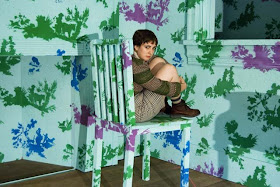The backdrop of Kurt Weill's ballet chanté The Seven Deadly Sins was a giant map of the United States, with lights following the route of Anna I (soprano Kate Mangiameli) and Anna II (dancer Toni Melaas) as they criss-crossed the country experiencing sloth, pride, anger, gluttony, lust, greed, and envy for seven years, all while attempting to earn money to send home to their greedy family to build a house. Castleton Resident Stage Director William Kerley created diverting, simultaneous settings onstage between the Annas on the road and the family in Louisiana, with fat suits and fake tattoos that reinforced the particular sin of the moment. Mother, robustly sung by bass-baritone Tyler Simpson, was particularly memorable in her giant pink night gown and hair curlers. This also compensated for the somewhat less than imaginative, yet concise compositional style of Weill. One wished Mangiameli had as many splendid musical opportunities to shine as Melaas did dancing, as they both worked to create the single persona of Anna. The male quartet comprising the family back home were equally strong as soloists, particularly tenor Tyler Nelson as Father, and as a barbershop quartet singing "gluttons never go to heaven." Presenting this entertaining work over a new Britten production or revival was a smart choice programmatically, even if some in the audience were annoyed and disinclined to clap heartily. Levi Hammer conducted assuredly.
Lorin Maazel led a big orchestra and cast in Ravel's L'enfant et les sortilèges (The Child and the Spells), a work as much seeped in fantasy as the Weill was starkly in over-the-top reality. Due to an onstage fall during rehearsal, the ill-behaved Child taunted by his animate objects, was sung in the pit by Cecelia Hall as planned, yet mimed by Norra Graham Smith on stage. Set in the Child's bedroom on a big wooden platform with colorful wallpaper, and later in a garden, over twenty soloists were able to have their moment onstage. From a clock (Alex DeSocio), a dragonfly (Elizabeth Reiter), caterwauling coital cats (Ricardo Rivera and Jessica Klein), and a children's chorus skillfully spouting word problems and arithmetic, it was fun for all. After much creativity in costuming (Nicholas Vaughan) and orchestration, Ravel's score builds most beautifully in the garden scene where the Child mends the wound of a squirrel he injured. The angry animals and objects soon soften and mend the Child's wound after injuring him, leading him home to his mother (mezzo Margaret Gawrysiak).
Terry Ponick, Castleton Festival's classy Weill and Ravel (Washington Times, July 11) |
This performance will be repeated on Saturday (July 23, 2pm).

No comments:
Post a Comment